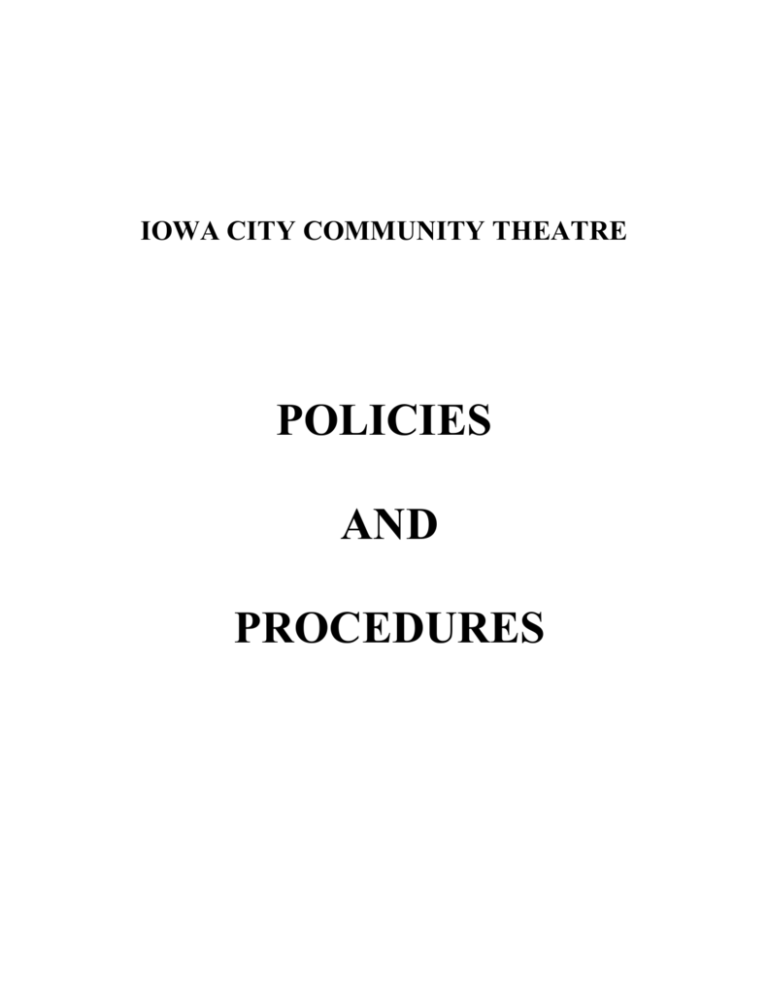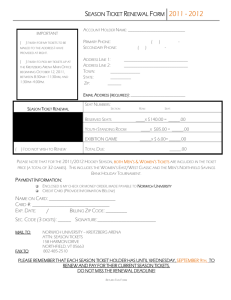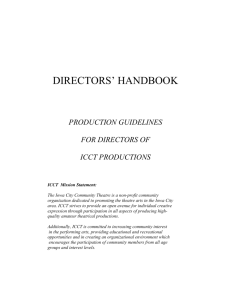- American Association of Community Theatre
advertisement

IOWA CITY COMMUNITY THEATRE POLICIES AND PROCEDURES PREFACE In more than half a century, ICCT has adopted and developed many policies and procedures to facilitate the smooth operation of its theatre and business operations. Previous versions of this handbook were prepared as a guide for the Board of Directors and other ICCT volunteers. During the 2006-2007 season, our committee has worked to update the By-Laws of the Iowa City Community Theatre, the Directors’ Handbook, and the Policies and Procedures manual. It is our hope that these documents will be of use to the current operation of ICCT and that they will be revised and updated as needed. Gerry Roe Mary Beth Schuppert Mary Ellen Chudacek June 2007 2 June 2007 2 TABLE OF CONTENTS Preface.......................................................................................................................... 2 Mission Statement........................................................................................................ 4 Affiliations & Memberships ........................................................................................ 4 Membership ................................................................................................................. 5 Contributor Categories ................................................................................................. 5 Budgets ........................................................................................................................ 5 Box Office & Tickets ................................................................................................... 6 Programs ...................................................................................................................... 7 Publicity & Advertising ............................................................................................... 7 Production Photography Procedures ............................................................................ 8 Keys/Building Security ................................................................................................ 8 Board Liaisons ............................................................................................................. 9 Building Use/Internal Policies ..................................................................................... 9 Cancellation of Scheduled Performance ...................................................................... 9 Special Activities ....................................................................................................... 10 Chamber Theatre ........................................................................................................ 11 Materials & Equipment .............................................................................................. 11 Hair & Makeup .......................................................................................................... 12 Lobby Display............................................................................................................ 12 House Manager .......................................................................................................... 12 Ushers ........................................................................................................................ 13 Box Office .................................................................................................................. 13 Play & Director Selection Committee ....................................................................... 13 Personnel .................................................................................................................... 14 Board Members’ Legal Liability ............................................................................... 15 3 June 2007 3 MISSION STATEMENT The Iowa City Community Theatre is a non-profit community organization dedicated to promoting the theatre arts of the Iowa City area. ICCT strives to provide an open avenue for individual creative expression through participation in all aspects of producing highquality amateur theatrical productions. Additionally, ICCT is committed to increasing community interest in the performing arts, providing educational and recreational opportunities and in creating an organizational environment which encourages the participation of community members from all age groups and interest levels. AFFILIATIONS & MEMBERSHIPS ICCT is affiliated with the Iowa City Parks & Recreation Department. When printed, the recreation center shall be listed as the Robert A. Lee Community Recreation Center. The Young Footliters’ affiliation with the Iowa City Community Theatre is designed to assist in the promotion of the dramatic arts in the Iowa City area. ICCT’s commitment to increasing community interest in the performing arts, providing educational and recreational from all age groups and interest levels is well served by a clear and supportive affiliation with The Young Footliters. This affiliation may involve financial support as well as the shared use of facilities, equipment and personnel. ICCT pledges to comply with the regulations and policies of its affiliates and requires that affiliates in turn comply with ICCT’s regulations and policies. ICCT is a member of the Iowa Association of Community Theatres, the American Association of Community Theatres, and the Iowa City Area Chamber of Commerce. 4 June 2007 4 MEMBERSHIP Membership shall be open, upon payment of dues, to all persons who are interested in the objectives of the organization. Voting privileges and eligibility to hold office shall be open to all members who are at least sixteen years of age. Current annual membership dues, established by the ICCT Board of Directors, are $20. Any person who contributes more than $20 to ICCT is considered a member. CONTRIBUTOR CATEGORIES Friend $ 75 - $149 Patron $ l50 - $499 Director’s Circle $ 500 - $999 Benefactor $1,000 or more BUDGETS The Treasurer shall serve as chair of a committee to prepare a budget for approval by the Board of Directors prior to the beginning of the fiscal year. Budgets for individual productions are approved by the Board. The Director (or designated representative) is responsible for authorizing production expenditures within the agreed budget. No expenditures in excess of the approved budget shall be made without the knowledge of the Production Council and/or Board of Directors. The Executive Committee may, in unusual circumstances, authorize expenses in excess of the approved budget. Such action must be reported to the Board and included in the minutes of the next Board meeting. At the discretion of the Board, expenditures in excess of the approved budget might not be authorized for reimbursement. Any expenditure of $200 to $499 for a single item must be approved by the Production Coordinator or the Executive Committee before the expenditure is made, even if the total expense falls within the approved budget for a production. Any expenditure of $500 or more for a single item must be approved by the Executive Committee before the expenditure is made. Revised March 2008 5 June 2007 5 BOX OFFICE & TICKETS Ticket Prices Season tickets shall be $75 (to include five productions) Individual tickets shall be as follows: $15 Adult 13 Senior Citizen (60+)/Student 10 Children (under 12) 12 Group Rate (10 or more tickets) . At the discretion of the Board, special prices may be established. Such special rates should be included in all advertising, on the answering machine in the office, and posted in various locations throughout the theatre (i.e., the office/box office, concession stand and the lobby). Ticket Reservations Tickets reserved by telephone but not paid for will be held until 30 minutes prior to curtain time for the performance for which they were reserved. If not picked up and paid for by that time, they may be returned to the fund of tickets and made available to the general public. Tickets which have been paid for (by mail or by credit card on the telephone) will be held at the box office and are not subject to release, as tickets to the same seat cannot be sold twice. Since tickets are sold at outlets such as J. Frahm Keyboards, Technigraphics, and the Robert A. Lee Recreation Center, box office personnel must be aware that in the case of sold-out shows with waiting lists, there may be latecomers who have tickets in hand and who cannot be turned away. Complimentary Tickets/Program Credits Complimentary tickets and/or program credits may be offered in return for loan of furnishings, costumes, or other special favors. These tickets and credits should be offered sparingly and only with the specific approval of the President. Some complimentary tickets for the season are given in return for services or large gifts. The list of organizations and individuals receiving complimentary season tickets shall be reviewed by the Board as soon as practical before distribution each season. Complimentary show tickets are offered to the cast and crew as follows: Director 2 tickets Assistant Director 2 tickets Stage Manager (if different than Asst. Director) 2 tickets Music/Orchestra Director 2 tickets (Page Revised 8/20/2008) 6 June 2007 6 Technical crews/ designers 1 ticket per crew member Cast 1 ticket per cast member Orchestra 1 ticket per orchestra member If an individual fills more than one role for a given production, or works on more than one crew, the individual will receive only 1 ticket. Cast and crew may purchase additional tickets at the group rate. Benefits Up to three benefit performances can be sold for each production. Benefits are sold at a cost of $2,000 for musicals and $1,000 for non-musicals. Any benefit performance dates shall be included in the dates given to the director prior to auditions so that the assistant director and all others who will be involved in the production are aware of them prior to making a commitment to the show. No benefit performance shall be sold after a show has been cast without the express approval of the show’s director. Before giving such approval, the director shall ask the cast and crew for their approval as well. PROGRAMS The program editor has full responsibility for preparing and editing programs for all ICCT productions. At the beginning of each season, the office manager or ICCT President will provide standard program information, including names of ICCT Officers and other members of the Board of Directors, Standing Committees, Production Council, and ICCT contributors. Information for each production (cast/crew lists, bio sheets, acknowledgments, etc.) must be given to the program editor at least two weeks prior to the invited dress rehearsal. The program editor will submit program copy to the director at least 24 hours prior to submitting copy to the printer. Any unavoidable last-minute acknowledgments will be placed on a program insert. Any changes in instructions to the printer must be authorized by the program editor. Printed programs are to be delivered to ICCT or to the program editor. PUBLICITY & ADVERTISING All materials (posters, programs, etc.) publicizing activities and production of the Iowa City Community Theatre must display the logo and the name of the theatre. 7 June 2007 7 The publicity and advertising coordinator has full responsibility for preparing and editing advertising copy for all ICCT productions. At the beginning of each season, the office manager or ICCT President will provide standard publicity and advertising information, including the name of each production, its author(s), and dates of production. The publicity coordinator will arrange and schedule day and time for an appearance on “The Dottie Ray Show” on KXIC Radio by the director (and/or other representatives) of each show. PRODUCTION PHOTOGRAPHY PROCEDURES A photographer will take photos of each production at a dress rehearsal before opening night. These photos will be the permanent record of the production and the photographer will make them available to the director so that cast and crew can order copies if they choose. A group photo of cast and crew will usually be taken at the end of the evening and can be included in photo orders. Proofs will be available (in a photo album) for perusal during the second weekend of performances. An order form will be available for each person in the cast and crew to complete, listing the pictures they want. Payment is to be deposited in an attached envelope. The photographer will pick up all orders on closing night and may choose not to accept any orders after closing night. As orders are processed and completed they will be delivered by mail. Directors will receive the entire set of proofs as a keepsake from ICCT. KEYS / BUILDING SECURITY Security for the ICCT building and its equipment therein is of vital importance to the livelihood and safety of the theatre. A limited number of keys for the building doors and for the ICCT office are issued. Current policy has included keys issued upon receipt of deposit check to the Executive Committee of the Board, the Office Manager, and the director and assistant director of an ICCT production .Each person issued a key must sign a Key Contract, stating the purpose for which the key will be issued, when it will be issued and when it will be returned and accompanied by a deposit check of $100.00 to be returned when the key is returned. Keys issued for a specific production should be returned as soon as possible after the production is completed. Keys may not be loaned to anyone. In the event the key is lost, the deposit check will be cashed. Access to the Theatre Office should be limited to those having business there. The office should remain locked during rehearsals. Office phones should not be used; a phone is available in the kitchen. 8 June 2007 8 BOARD LIAISONS One or two members of the Board will be assigned to each production. A board liaison should not be involved in a show for which s/he is designated a board liaison. The Board Liaison should introduce him/herself to all persons involved in the production and express ICCT’s appreciation for their involvement and invite any who do not hold membership in ICCT to become members. All cast and crew are invited to direct questions or concerns to the Board Liaison, who will hold such questions or concerns in confidence but deal with the concern through the Board or Production Council and report back to the person(s) raising the concern when the question is resolved. BUILDING USE/INTERNAL POLICIES All spaces in the building or at other locations will be scheduled on the master calendar in the Office. Mainstage productions always have priority in the use of ICCT space; however, this does not preclude another activity from being scheduled in the building. Multiple activities in different spaces shall be allowed. If the lobby is used for any activity, it must be returned to its usual arrangement upon completion of the activity. During the run of a show, the set area will not be used for any other purpose without the express permission of the current director. Access to the light/sound booth shall be restricted to the director, crew, stage manager, and technical director. No one shall be allowed backstage just before or during the performance of a production, except the cast, production staff, and crew for that performance. The house manager and assistant director or stage manager will handle deliveries of flowers, refreshments, requests to visit actors, etc. ICCT has been designated a smoke-free environment. Alcohol and illegal substances are prohibited. Under no circumstances will anyone using alcohol or illegal substances be authorized to use power tools, ladders or scaffolding, or high-voltage equipment. Cameras and Recording Devices Use of videocameras and/or recording equipment is prohibited during ICCT performances or rehearsals. Royalties are paid by ICCT to the author or to the author’s agent or representative only for performance of the material on a specific date and for a specific audience. Violation of this policy can result in loss of future performance rights from the licensing company. In the case of material in the public domain, recording devices may be permitted during rehearsals with the consent of the director and cast members. CANCELLATION OF SCHEDULED PERFORMANCE Under certain conditions, the President or Vice-President of ICCT may decide that a performance should be cancelled. For example, extremely inclement weather, unforeseen 9 June 2007 9 illness or injury, a catastrophic event either to the Theatre or the community, or other circumstance might suggest the wisdom of canceling a performance. Final responsibility for a cancellation shall lie with the President or Vice-President. Once it has been determined that a performance will be cancelled, it will be the director’s responsibility to contact all cast and crew members. It will be the responsibility of the President, VicePresident, or office manager to notify all other personnel scheduled to work the performance and to get the word out to the public. Tickets for the cancelled performance may be exchanged for a future performance of the same production or a future production in the season. Refunds will be issued only on a per-case basis, i.e., the ticketholder is from out of town and will be unable to attend another ICCT production, or the production is the last of the season. Refund decisions may be made by box office personnel, the office manager, or the President (whoever can most easily be contacted for an immediate decision). If the show is consistently sold out, the cancelled performance may be rescheduled at the discretion of the President, the director of the production, the director of the upcoming production, and the production coordinator. The director of the current production is responsible for contacting each member of the cast and crew to determine their availability for a rescheduled performance, prior to announcing that the performance will be rescheduled. SPECIAL ACTIVITIES Invited Dress Rehearsal: The Thursday before a Friday opening night (or another night before the opening) shall be an invited dress rehearsal. To produce an audience for the dress rehearsal, selected groups may be invited to attend. The theatre typically invites persons who might not otherwise be able to attend. Passes will be issued by the office manager for admission to the dress rehearsal .There is no charge for these passes. Usually the invited dress rehearsal is scheduled for the Thursday before opening night. If the director needs to schedule another night for this event, the new date must be provided to the President and office manager at least two weeks prior to the rescheduled date to allow sufficient time to notify the invited audience. Performance Guests: The publicity coordinator and President will determine whether individuals or groups such as the Fair Board, specific contributors, etc., are to be invited to the opening night or other performances with complimentary tickets for such performances. 10 June 2007 10 CHAMBER THEATRE The purpose of Chamber Theatre is to provide performances under the auspices of ICCT for experimental, original and/or established works and to provide learning experiences for directors, actors, playwrights, poets and multimedia and technical people. These performances may be of theatrical, poetic and/or musical materials. These productions may be staged at the ICCT building or elsewhere in the community. Budget funds will be provided by ICCT as agreed upon by the Chamber Theatre Chair and the Board of Directors. It is understood that Chamber Theatre productions will not interfere or compete with mainstage productions. Plans and arrangements for each production to be performed at ICCT will be handled by the Director, crew and Production Council. Arrangements for productions elsewhere will be handled by the director, crew and person/organization for which the production is to be performed. It is expected that Chamber Theatre may use ICCT space, materials and equipment by arrangement with appropriate Production Council consultants. Office personnel and other support services for mailings, publicity and newsletter announcements may be used by Chamber Theatre. In addition to the budget allowance, a price per performance may be charged or donations requested to meet expenses. Any profits shall be accrued to ICCT. MATERIALS & EQUIPMENT ”Materials and equipment” include but are not limited to properties, costumes, wig and makeup materials, sound, light and electrical equipment, orchestra stands and equipment, set design and construction equipment, and shop tools. Items included in this definition may be revised from time to time, as appropriate. An inventory of materials and equipment should be prepared and maintained on the office computer. Such inventory shall include the quantity, size, brand and location of each item, as well as the date it was obtained. When an item is approved for disposal, that information will be added to the inventory, together with the date it was disposed of, the reason for the disposal, whether it was replaced, and the title of the person who authorized its disposal, e.g., Production Coordinator, consultant, etc. All items, when not in use, shall be clearly identified and stored to save space, to protect them from damage, and to allow for ease of location when they are needed. All tools, appliances and wiring should be in usable condition before going into storage. Any item valuable enough to save for future use should be tagged and noted on the inventory as needing repair. The person who would be responsible for repairing the item (or arranging for such repair) should be verbally notified as well. Once the item has been 11 June 2007 11 repaired, the repair should be noted on the inventory, along with the date and the name of the person by whom it was repaired. Materials and equipment of ICCT are the responsibility of the Production Coordinator and appropriate consultants. This includes their storage, maintenance, arrangement for loan, etc. Production staff of each show shall arrange with the appropriate consultant for materials and equipment to be used for the production; thereafter, such materials and equipment shall be the responsibility of the production crew for that production. Materials and equipment (costumes, properties, etc.) purchased for a specific production or previously owned by ICCT shall remain the property of ICCT and no arrangements shall be made with any cast or crew member to give, sell or otherwise dispose of such items without first obtaining the permission of the Production Coordinator and appropriate consultants. When materials and/or equipment are borrowed from an individual, business, or other theatre organization, a written agreement outlining the terms of the loan is required. See sample forms for borrowing and for lending materials appended to this handbook. HAIR & MAKEUP Actors will furnish their own makeup, except for special effects (ghost makeup, special colors, etc.) required for a specific production. Wigs, hair pieces (braids, beards, etc.) and special coloring products for hair effects (graying, etc.) will be furnished by ICCT. LOBBY DISPLAY A person or group of persons shall be designated as Lobby Display Coordinator. At times, a sponsoring organization, or the Board of Directors may have a special display request. If no specific request is made, it shall be the responsibility of the Lobby Display Coordinator to arrange for appropriate displays for each production. HOUSE MANAGER The House Manager Coordinator will schedule a designated House Manager for each production and will provide instructions for specific responsibilities, such as pre-show duties, arrangements for seating late arrivals, intermission routines and post-show inspection and adjustment of the house and lobby. The House Manager’s duties include running the concession stand at intermission. 12 June 2007 12 USHERS The Usher Coordinator will arrange for ushers for each performance to handle the responsibilities of welcoming audience members, collecting tickets, and distributing programs. Ushers may assist the House Manager in locating available seats for late arrivals and will assist the House Manager and Box Office personnel with concession stand duties at intermission. BOX OFFICE The Box Office Coordinator will arrange for two people to staff the Box Office for each performance. The Coordinator will provide instructions for specific responsibilities, such as pre-and post-show duties and intermission routines. Responsibilities of Box Office personnel include welcoming audience members, selling tickets to patrons, taking reservations for subsequent performance dates, distributing reserved tickets, preparing reconciliation forms and cash receipt forms for the Box Office and assisting Ushers and House Manager with concession stand duties at intermission. PLAY & DIRECTOR SELECTION COMMITTEE The Vice-President of the Board of Directors shall serve as Chair of the Play & Director Selection Committee. At the discretion of the Chair, the committee shall consist of at least six members. The Committee will consider plays for production, identify potential directors, and provide monthly reports to the Board of Directors until a season is proposed for approval by the Board. Directors from the current season may be considered for the next season; however, the Committee should attempt to increase the pool of directors. A director’s history of bringing in shows at or under budget shall be considered a factor for future directing opportunities. Potential directors will present an outline of their qualifications, experience, and preliminary plans for production at an interview before a quorum of the Play & Director Selection Committee. Season Scheduling The season shall include two productions in the fall and three productions after the first of the year, with no production in December (except for seasonal shows or special productions). Typical scheduling includes six performances of each production in two weeks, with Friday and Saturday performances at 7:30 p.m. and Sunday matinees at 2:00 p.m. Productions scheduled for the Englert Civic Theatre typically play only one week. 13 June 2007 13 Staging Policy Arena staging is preferred; however, the use of other staging will be considered. All staging decisions must be made by the time a proposed slate of shows is presented to the Board of Directors for approval. Not more than one change in seating arrangements should take place during the season. PERSONNEL ICCT is (with the exception of our Office Manager) an all-volunteer organization and ICCT policy, in general, prohibits payment to personnel for jobs that are normally performed by volunteers. Office Manager Position Duties ▪ Get mail from PO Box; sort and distribute to appropriate persons. ▪ Attend board and membership meetings and give office report. ▪ Establish and maintain a master calendar of ICCT and related activities (Cultural Corridor, etc.) ▪ Check phone and take care of messages; maintain up-to-date messages on answering machine. ▪ ICCT takes Visa and Mastercard; call in for approval on processed slips. Credit card companies deposit money into the checking account the next business day. ▪ Record payments for individual and season tickets. ▪ Keep deposit slips and bank card slips in file for tax purposes. ▪ Prepare thank-you letters for signature from copy submitted by President. ▪ Do mailings of brochures to prospective members and single-ticket people. ▪ Write and request permission to do productions as soon as possible. Deposits for musicals should be sent as soon as the contracts come. Royalties and rental for musicals need to be sent early enough to get materials before auditions. Royalties for plays need to be sent at least two weeks before opening night. ▪ Get approval for comp tickets from the Board. Lifetime members automatically get season tickets. ▪ For each show: Check with director for audition dates, schedule place; send postcards. Prepare tickets for productions. With director participation, prepare show notice to be mailed to season ticket holders three weeks before each production. ▪ Take tickets (10 per performance) to outlets: Rec Center, J. Frahm, and Technigraphics (Coralville). Pick up receipts from outlets after show closes ▪ Fill ticket orders. If we have a waiting list for a performance, season ticket holders are placed at the top of the list. ▪ Ensure musical materials are collected and returned to publishing house after show. ▪ Keep paid bill information filed by year and month. Maintain for 5 years for tax purposes. Page Revised September 2007 14 June 2007 14 ▪ Make copies of reports as necessary for Board and membership meetings. ▪ Check with groups we have been inviting to dress rehearsals to see if they are interested in coming for the season. Check with director to see what night the rehearsal will be. ▪ Write letter and send tickets at least two weeks before the date. ▪ Work with webmaster to keep web presence current. ▪ Post theatre events of interest. ▪ Order and maintain office supplies, envelopes, letterhead, stamps, copy paper. Replace toners in printers. ▪ We have been storing the grand piano at Stannard Storage; call and set this up for Insodus and Exodus. ▪ Other duties as assigned. Job evaluations shall be done on a yearly basis. Supervision of the office manager will be the responsibility of the Board of Directors or their designate. BOARD MEMBERS’ LEGAL LIABILITY To: ICCT From: Bruce Haupert Date: December 15, 1986 Directors, officers, employees and members are not liable for debts. Directors, officers, members and other volunteers are not liable for acts of omission performed in discharge of corporate duties. Employees are not exempt for acts or omissions, unless they commit the act or omission as a Director, officer, member or volunteer. Page Revised September 2007 15 June 2007 15






